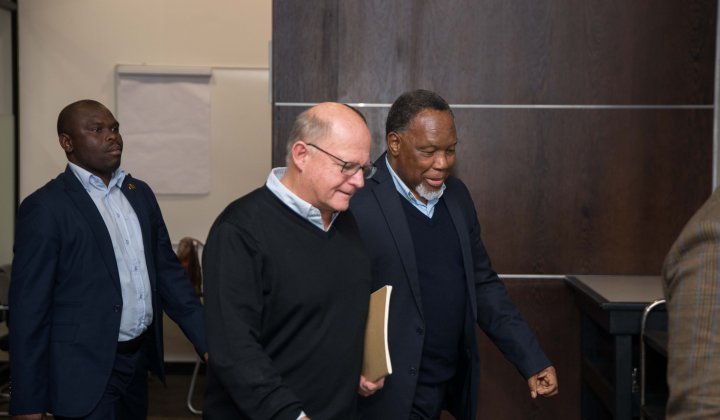There is an in-built contradiction to human beings. We are both insatiably curious and adaptable, and yet wired to find comfort in routine and the familiar. Never has this internal tussle been greater than in our attempt to navigate an ever-changing, hyper-complex and increasingly digital world. What we need, as individuals and leaders, is to develop greater adaptive capacity.
...from a psychological and self-development perspective we often rail against the notion of change...
With change whirling all around us, it’s often difficult to differentiate where we need to focus our energies, let alone how we can ever hope to adapt to such all-encompassing unpredictability.
In his book The Big Shift: The 83 Most Important Changes That Everyone Should Know About, and The Big Shift that Changes Everything, innovation author and consultant Langdon Morris neatly divides this cacophony of change into three parts: ‘world shift’, ‘mindset shift’ and ‘skills shift’. In short, structural changes like labour, capitalism and business; a personal focus on making sense of this new world and adapting accordingly; and new ways of working, leading and innovating to stay ahead of the pack.
While all are important considerations, without profound mindset shifts accompanied by personal growth it is unlikely that deep, sustainable change can effectively be achieved without a high level of adaptation. This underlies the importance of developing leaders capable of supporting organisations through adaptation and transformation. And this is where adaptive capacity steps in.
What is adaptive capacity?
Broadly speaking, adaptive capacity refers to one’s ability to adjust to a changing environment and system. Inherently, human beings certainly understand the importance of this type of evolution, but from a psychological and self-development perspective we often rail against the notion of change – clinging to the tried-and-trusted ways of the past. Change, however, is deeply transformative and can be incredibly positive. Yes, it is stressful and can at times be adversarial, but it forges hardy individuals capable of resilience, perseverance, optimism and the important skill of leading others through change.
In theory, these are precisely the skills and competencies required of today’s business leaders, and yet for many companies, the preferred ‘toe-the-line’ culture is fiercely at odds with encouraging a more entrepreneurial, adaptive style of leadership.
Obviously there are exceptions, such as enterprising organisations like Pixar, Google, Apple and the African Leadership University, but for the most part moving up the corporate ladder is less about climbing and more about sitting in the system. Companies tend to groom employees who are rule followers, who play the game and who don’t wilfully rock the boat. Therein lies the rub.
Why every great company needs adaptive capacity
While many current leaders, and those in the corporate pipeline, are competent managers capable of dealing effectively with technical challenges by applying proven methodologies and often achieving good results, there is no blueprint for tackling an adaptive challenge. This unsettles managers – many of whom have attained the position but may not necessarily yet possess the requisite leadership skills to guide companies through a sea of disruption.
Consider the world of banking. The sector is being battered by disruption and digitisation. In South Africa, we are seeing the rise of new digital banks like TymeBank, Discovery Bank and Bank Zero. Faced with fresh, innovative, legacy-free start-ups, the traditional top-down banking leadership model of Mancos and Excos executing downwards is hardly conducive to leading at speed and yet, if they don’t, they will lose out. But they are tussling with a traditional banking model that is not geared towards fast decision-making and slimline structures. This discrepancy alone is causing an overwhelming sense of stress within these organisations and that’s completely normal.
However, in order to steady this mounting insecurity, leaders are needed who can take risks, who can manage up and down and sideways, and who lead through impact and influence rather than approval and mandate.
The scope of leaders has massively increased as they navigate both the professional and emotional by-products of change. While leaders need to support teams, they also need to manage their own boundaries and potential for burnout. A more human-centric orientation is required to better connect to what makes human beings both unique and productive, as well as vulnerable.
How to boost adaptive leadership
Not surprisingly, teaching such traits cannot be achieved through outdated leadership education which involves sitting in a classroom and taking in information. By its very nature, new methods must be more integrated, collaborative, interactive and digitally focused. Future leaders must be challenged to step out of their comfort zones on a weekly – if not daily – basis if they are to get comfortable with discomfort.
Organisations themselves need to look at their structures, and support people who think on their feet and stick their necks out. Businesses must foster a wide range of continual learning interventions and build a culture of openness to new experiences and ideas. After all, adaptive capacity is about finding your orientation in new and unfamiliar environments, such as immersing yourself in new countries or stimulating your senses by experimenting with novel experiences. It is critical, both inside and outside the workplace, that leaders engage in a meaningful way with people and cultures that think differently to them and challenge their assumptions.
Encouragingly, many companies are currently using unusual learning interventions, such as cultural immersions and cross-industry exchanges. What is important is that the company does not then expect radical shifts after only a few hours of a one-off experience. Developing adaptive capacity requires something more enduring, such as working with a professional coach – one trained in helping leaders identify the mindsets, beliefs and attitudes that might be holding them back and, in the process, boosting their agility, mindfulness and self-belief adaptability.
Leaders themselves need to ‘hold the space’ for others. It is critical that they recognise how those around them might be even more concerned. While leaders themselves might not know what the future holds, they can express confidence in a team’s ability to experiment, to innovate and to figure it out together. Unlike classical leaders who know and show the way, an adaptive leader will facilitate the best thinking and then collaboratively set the course.
...there is no blueprint for tackling an adaptive challenge.
The implications of a head-in-the-sand approach
A robust example of what happens when mindset, belief and attitude fail to shift at scale is in the challenges facing education in a Fourth Industrial Revolution world. Globally, educators are battling to envisage a system completely removed from the model instituted back in the First Industrial Revolution. Yes, we’re seeing radical adaptation in pockets, such as the move by many Scandinavian countries as well as our very own Future Nations Schools, that allow children more time to play and explore. However, at large, education continues to exist as it has for generations, albeit with a healthy dose of technology thrown in for good measure. Leaders in this field need to reconsider the system and its potential through the eyes of adaptive capacity.
[Such] a leader is...rather a facilitator of fresh thinking...
Reluctance to shift is often due to the fact that people are scared of loss and fear change and the future. But an adaptive leader would bring foresight to such a stalemate, would have the courage to spot what needs to change and the acumen to pull all the right people together and create an inducive environment to foster change.
Globally we are seeing this type of thinking in action in the agricultural sector where, in the likes of the United States, corn yields have increased dramatically over the last 50 years through technological innovations like crop irrigation, the development of gene editing, better fertilisers and new farming techniques.
Companies like Cape Town-based start-up Aerobotics are also revolutionising how farmers monitor their fields. By using drone and satellite imagery to analyse crops and farmlands, the company enables advanced crop monitoring to save man-hours, increase productivity and manage crop yields.
Farmers who don’t incorporate these methods risk being unable to compete. However, such innovations also raise issues around farmworkers being replaced by technology. How farming communities and governments deal with the human implications of these shifts will require adaptive thinking and effective collaboration.
This is not always easy to achieve if the values and mindsets of all parties do not shift. Take, for example, the stressors associated with consistent organisational change. Gone are the days of a secure career in a large corporate as banks close branches, artificial intelligence threatens job security and innovations, like driverless cars, disrupt established business empires. The lack of certainty is fuelling anxiety and, in this context, the adaptive challenge is to shift mindsets from ‘job-for-life’ thinking to include more flexible employment options and a willingness to adapt skills. It means changing how we handle our finances, structure our lives and deal with unrelenting demands on our time.
How organisations and individuals deal with these challenges will require, as Yuval Noah Harari, the Israeli historian, futurist and author of Sapiens and Homo Deus, puts it: “… a lot of mental flexibility and great reserves of emotional balance. You will have to repeatedly let go of some of what you know best, and feel at home with the unknown.”
In such a reality it is also critical that leaders maintain a sense of adaptability while fiercely protecting the intrinsic trust in their abilities and competencies, something psychologists call self-efficacy. Such a leader is no longer someone elegantly poised on a pedestal, but rather a facilitator of fresh thinking, someone who is skilled at the art of critical questioning and fueled by unrelenting curiosity.
If this sounds too good to be true, then take heart that leaders can develop to this point with the right coaching, through ongoing practice and thanks to the brain’s marvellous ability to reshape itself. It starts by stepping out of your comfort zone.
How to build adaptive capacity
· Understand and evaluate context – by using powerful questioning frameworks and deep environmental exploration.
· Be self-aware – through practiced mindfulness, taking psychometric tests and listening to feedback.
· Challenge fundamental assumptions – by examining biases and beliefs that frame world views.
· Embrace a new leadership identity – allow yourself to be vulnerable, facilitate exploration, experimentation and collective thinking.
· Develop ‘comfort with discomfort’ – through rigorous practice and discipline, supported by mindfulness, reflection, observation, emotional regulation, self-efficacy beliefs and support networks.
· Accept that change is linked to loss, whether real or perceived – manage your own concerns, emotions, fears and reaction to change, so you can support teams more confidently and effectively.
KEY TAKEAWAYS
· Adaptive capacity refers to the ability to adjust to a changing environment and system.
· In the face of disruption and unprecedented change, accelerated by technology and digitisation, leaders and organisations cannot rely on old ways and outdated methods.
· Without developing adaptive capacity, companies may manage technical change but will fall short of the level of agility required to fully transform.
· In this environment, a leader is no longer someone on a pedestal but rather a facilitator of fresh thinking who is skilled at the art of critical questioning and possesses unrelenting curiosity.
· These traits can be taught, but not through traditional methods.
Tanya Stevens is a Professional Associate at GIBS, a PCC-qualified Integral Coach and a member of The Change Leaders, an international community of change agents focused on supporting large-scale change initiatives. She founded her consultancy business BeClear in 2006 with the specific aim of supporting clients in successfully navigating change and enhancing their leadership, resilience and adaptive capacity. Tanya enjoys working with intentional individuals, leaders and organisations that care deeply about balancing peak performance with sustainability.
Natalie van der Veen is a trained business coach and experienced writer, passionate about people, brands and communication. She is especially interested in the potential of human-centric organisations and has spent time researching, writing and consulting on the topic. Her experience in both coaching and facilitation has supported her ongoing research into impactful leadership in the 21st century. Natalie currently lives in Los Angeles, CA.





